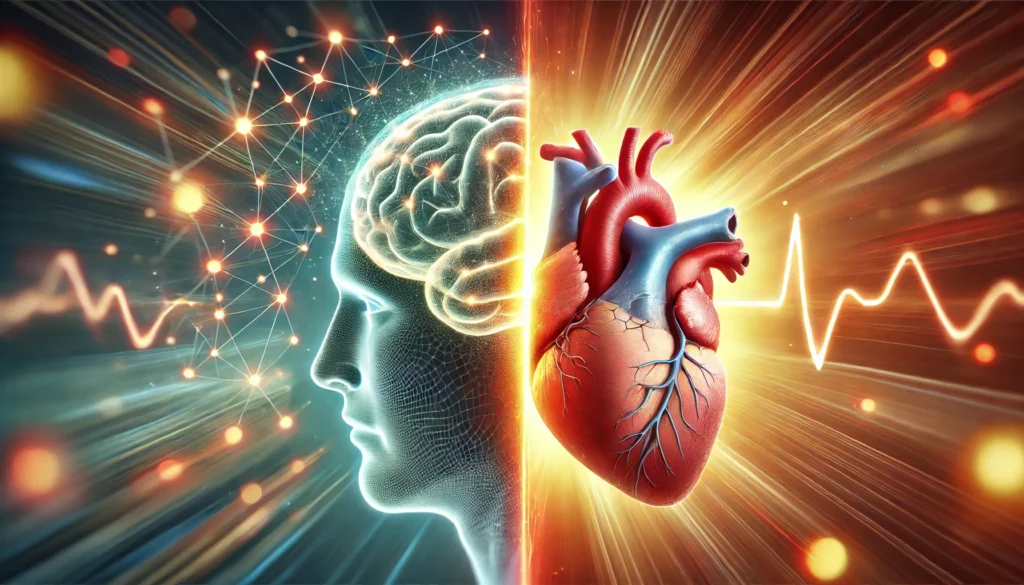Introduction: The Interconnection Between Physical and Mental Well-Being
The ancient adage “a healthy body, healthy mind” underscores the intrinsic relationship between physical health and mental clarity. Modern scientific research continues to validate this timeless wisdom, demonstrating that our cognitive vitality is profoundly influenced by our overall physical well-being. Understanding this connection is crucial not only for enhancing day-to-day mental performance but also for promoting longevity and preventing age-related cognitive decline. In an era where chronic diseases and neurodegenerative conditions are on the rise, adopting a lifestyle that supports both the body and mind is more important than ever.
You may also like : Best Things for Brain Health: Expert-Backed Strategies to Keep Your Mind Sharp
The pursuit of a healthy mind and body is not a singular effort but rather a holistic integration of various factors, including nutrition, exercise, sleep, stress management, and social engagement. Each of these components plays a pivotal role in maintaining optimal brain function and overall health. Moreover, emerging research suggests that the microbiome, inflammation levels, and hormonal balance significantly impact both mental acuity and physical resilience. By implementing science-backed strategies that optimize these factors, individuals can enhance their cognitive function, slow down aging, and improve their overall quality of life.
This article explores the most effective, evidence-based approaches to achieving a healthy body and healthy mind. From dietary interventions that nourish brain cells to exercise regimens that promote neurogenesis, we will delve into the interconnected strategies that support longevity and cognitive vitality. Whether you seek to sharpen your focus, boost your mood, or extend your health span, the insights provided here will serve as a comprehensive guide to achieving optimal well-being.
The Role of Nutrition in Cognitive Health and Longevity
Diet is one of the most influential determinants of both physical and mental health. A nutrient-dense diet provides the essential building blocks for brain function, supports cellular repair, and reduces inflammation, which is a key driver of cognitive decline and aging.
A diet rich in antioxidants, omega-3 fatty acids, and essential vitamins promotes brain health by protecting neurons from oxidative stress and supporting synaptic plasticity. Omega-3s, found in fatty fish like salmon and walnuts, have been extensively studied for their role in enhancing memory and cognitive function. Additionally, flavonoid-rich foods such as blueberries and dark chocolate have been shown to improve neuronal signaling and reduce neuroinflammation.
Another crucial dietary factor is the Mediterranean diet, which has been consistently linked to improved cognitive performance and reduced risk of neurodegenerative diseases. This diet emphasizes whole foods, lean proteins, healthy fats, and complex carbohydrates, creating an optimal environment for brain health. Studies have shown that individuals who adhere to this dietary pattern exhibit a lower incidence of Alzheimer’s disease and maintain better cognitive function as they age.
Furthermore, intermittent fasting and time-restricted eating have gained attention for their neuroprotective benefits. These dietary approaches stimulate autophagy, a process that clears damaged cells and proteins from the brain, reducing the risk of cognitive decline. Research suggests that fasting may enhance brain plasticity and improve mental clarity by promoting ketone production, which serves as an efficient energy source for neurons.
Hydration also plays a critical role in cognitive function. Even mild dehydration can impair focus, memory, and mood. Ensuring adequate water intake throughout the day supports brain cell function and helps flush out toxins, contributing to overall mental clarity. By making strategic dietary choices, individuals can fortify their cognitive health while simultaneously supporting longevity.
The Power of Physical Exercise in Enhancing Cognitive Function
Regular physical activity is one of the most powerful tools for maintaining a healthy mind and body. Exercise not only strengthens the cardiovascular system but also stimulates brain-derived neurotrophic factor (BDNF), a protein that supports the growth and survival of neurons. Higher levels of BDNF are associated with enhanced memory, learning, and cognitive resilience against age-related decline.
Aerobic exercise, such as running, swimming, and cycling, increases blood flow to the brain, delivering oxygen and essential nutrients to neurons. Studies have shown that individuals who engage in consistent aerobic activity exhibit improved executive function, quicker reaction times, and greater overall mental agility. Furthermore, resistance training, including weight lifting and bodyweight exercises, has been linked to increased hippocampal volume, which is essential for memory and spatial navigation.
Beyond structured workouts, incorporating movement throughout the day is equally important. Sedentary behavior has been associated with reduced cognitive function and an increased risk of dementia. Simple habits like taking walking breaks, using a standing desk, and engaging in activities such as yoga and tai chi can counteract the negative effects of prolonged sitting.
Exercise also plays a crucial role in mental health by reducing stress, anxiety, and depression. Physical activity triggers the release of endorphins and serotonin, neurotransmitters that promote a positive mood and mental well-being. Additionally, engaging in exercise routines that involve coordination, such as dance or martial arts, can further enhance neuroplasticity and cognitive function by challenging the brain in novel ways.

Optimizing Sleep for Mental and Physical Health
Sleep is a cornerstone of overall health, yet it is often neglected in modern lifestyles. Poor sleep quality can impair memory consolidation, emotional regulation, and immune function, while chronic sleep deprivation increases the risk of neurodegenerative diseases.
Deep sleep is particularly critical for cognitive vitality, as it is during this phase that the brain clears metabolic waste, consolidates memories, and processes emotional experiences. The glymphatic system, a network of channels that remove toxins from the brain, operates most efficiently during deep sleep, reducing the accumulation of harmful proteins linked to Alzheimer’s disease.
Establishing a consistent sleep schedule is essential for maintaining circadian rhythm balance, which governs hormonal regulation and cognitive performance. Exposure to natural light in the morning and limiting blue light exposure in the evening helps synchronize the body’s internal clock, promoting restful sleep. Additionally, optimizing sleep hygiene by maintaining a cool, dark, and quiet sleeping environment can enhance sleep quality.
Mindfulness practices, such as meditation and progressive muscle relaxation, have been shown to improve sleep duration and quality. By reducing stress and activating the parasympathetic nervous system, these practices help individuals transition into restorative sleep states. Prioritizing sleep as a non-negotiable aspect of health fosters both longevity and mental acuity, reinforcing the link between a healthy body and healthy mind.

Frequently Asked Questions: Healthy Body, Healthy Mind
1. How does maintaining a healthy body contribute to cognitive longevity?
A healthy body directly influences cognitive longevity by ensuring optimal blood circulation, reducing inflammation, and supporting neuroplasticity. Regular physical activity enhances the production of brain-derived neurotrophic factor (BDNF), which plays a critical role in forming new neural connections and protecting against cognitive decline. Additionally, a nutrient-rich diet filled with antioxidants, healthy fats, and essential vitamins helps to combat oxidative stress, a major contributor to neurodegenerative diseases. The relationship between a healthy body and a healthy mind is also evident in hormonal balance—regular exercise and proper nutrition regulate cortisol and insulin levels, both of which impact cognitive function. By prioritizing physical well-being, individuals can sustain mental acuity and reduce the risk of age-related cognitive disorders.
2. Can stress management improve both mental and physical health?
Yes, effective stress management is crucial for achieving a healthy mind and body. Chronic stress leads to prolonged activation of the hypothalamic-pituitary-adrenal (HPA) axis, resulting in elevated cortisol levels, which can damage brain cells, impair memory, and weaken the immune system. Mindfulness techniques, such as meditation and controlled breathing, have been shown to reduce stress hormones and improve cognitive function. Additionally, engaging in activities like yoga or tai chi enhances relaxation while simultaneously promoting flexibility and cardiovascular health. The integration of stress reduction techniques into daily life contributes to long-term physical resilience and mental clarity.
3. How does gut health impact brain function and overall well-being?
Emerging research highlights the strong connection between gut health and brain function, known as the gut-brain axis. The microbiome, which consists of trillions of bacteria in the digestive system, influences neurotransmitter production, including serotonin and dopamine, which are critical for mood regulation. An imbalance in gut bacteria has been linked to cognitive disorders such as anxiety, depression, and even Alzheimer’s disease. Consuming prebiotic and probiotic-rich foods, such as fermented vegetables and yogurt, fosters a healthier gut environment that supports mental well-being. Maintaining digestive health through fiber intake, hydration, and reduced processed food consumption strengthens both the healthy body and healthy mind.
4. What role does social interaction play in maintaining cognitive vitality?
Social engagement is a key factor in sustaining cognitive function and emotional well-being. Studies suggest that individuals with strong social networks exhibit a lower risk of cognitive decline and dementia. Engaging in meaningful conversations, group activities, and collaborative projects enhances mental stimulation and supports emotional resilience. Furthermore, positive social interactions promote the release of oxytocin, a hormone associated with stress reduction and improved mood. Prioritizing social connections fosters a balanced, healthy mind and body by providing emotional support and intellectual engagement.
5. Is there an ideal balance between mental and physical activity for brain health?
Yes, an optimal balance of mental and physical activity is essential for maintaining cognitive health. Engaging in mentally stimulating activities, such as reading, problem-solving, or learning new skills, helps strengthen neural connections and delays cognitive decline. However, these benefits are maximized when combined with regular physical exercise, which enhances blood flow and oxygen delivery to the brain. Activities like dancing, which require both mental engagement and physical movement, offer compounded benefits. Striking a balance between these two aspects ensures comprehensive support for a healthy body and healthy mind.
6. How does hydration affect brain function and energy levels?
Proper hydration is fundamental to maintaining cognitive clarity and sustained energy levels. The brain is composed of nearly 75% water, and even mild dehydration can lead to fatigue, impaired concentration, and mood fluctuations. Drinking adequate amounts of water throughout the day supports neurotransmitter function and reduces the risk of brain fog. Additionally, hydration assists in detoxification by helping the body eliminate waste products that may contribute to inflammation and cognitive sluggishness. Ensuring consistent hydration reinforces both physical endurance and mental sharpness.
7. What are the long-term effects of poor sleep on cognitive health?
Chronic sleep deprivation significantly increases the risk of cognitive decline, memory impairment, and neurodegenerative diseases. During sleep, the brain undergoes crucial processes such as memory consolidation and toxin clearance via the glymphatic system. Poor sleep quality disrupts these functions, leading to increased beta-amyloid accumulation, a hallmark of Alzheimer’s disease. Additionally, inadequate sleep is linked to higher stress levels, insulin resistance, and weakened immune response, further compromising overall health. Prioritizing restorative sleep ensures a well-balanced, healthy mind and body over the long term.
8. How can adopting a plant-based diet benefit cognitive function and longevity?
A plant-based diet rich in whole foods, antioxidants, and healthy fats supports both longevity and cognitive function. Vegetables, legumes, nuts, and seeds provide essential nutrients that reduce inflammation and promote neuroprotection. For instance, flavonoids found in berries have been shown to enhance memory and slow brain aging. Omega-3 fatty acids, abundant in chia seeds and walnuts, support neuronal integrity and reduce the risk of cognitive decline. A well-balanced, plant-based diet fosters a healthy body and healthy mind by nourishing brain cells and minimizing the impact of oxidative stress.
9. What impact does mindfulness have on cognitive flexibility and emotional resilience?
Mindfulness practices enhance cognitive flexibility by training the brain to adapt to new challenges and regulate emotions more effectively. Regular mindfulness meditation strengthens the prefrontal cortex, which governs executive function, attention, and decision-making. Additionally, mindfulness reduces activity in the amygdala, the brain’s fear-processing center, leading to improved stress management. These effects contribute to better emotional regulation, enhanced creativity, and a heightened ability to focus. Incorporating mindfulness into daily routines supports a healthy mind and body by fostering mental clarity and emotional stability.
10. Can biohacking techniques optimize brain function and longevity?
Biohacking, or the practice of using science-based techniques to enhance cognitive and physical performance, is gaining traction as a method to promote longevity and mental acuity. Techniques such as intermittent fasting, red light therapy, and nootropic supplementation aim to optimize brain function and overall well-being. Cold exposure and breathwork exercises have been shown to increase resilience to stress and boost energy levels. While biohacking strategies vary in effectiveness, those based on scientific research can provide valuable benefits for sustaining a healthy body and healthy mind. When approached responsibly, biohacking offers innovative ways to enhance cognitive performance and extend healthspan.

Conclusion: Embracing a Lifestyle That Fosters Longevity and Cognitive Vitality
Achieving a balance between a healthy mind and body requires a multifaceted approach that integrates nutrition, exercise, sleep, and stress management. Scientific research continues to reinforce the profound interconnection between physical health and cognitive function, highlighting the importance of adopting a proactive lifestyle.
By nourishing the body with brain-boosting foods, engaging in regular physical activity, and prioritizing restful sleep, individuals can significantly enhance their cognitive vitality and overall well-being. The strategies outlined in this article serve as a guide for those seeking to improve mental clarity, emotional resilience, and longevity. As research advances, it is becoming increasingly clear that the choices we make today directly influence our cognitive health and longevity in the years to come.
Embracing these evidence-based practices ensures that both body and mind remain vibrant, allowing individuals to enjoy a fulfilling and enriched life. The journey toward a healthy body and healthy mind is a lifelong endeavor—one that promises enhanced quality of life and sustained mental sharpness well into old age.
brain health optimization, cognitive longevity strategies, neuroprotective lifestyle, mental clarity enhancement, optimal brain function, anti-aging nutrition, longevity science, mind-body wellness, stress resilience techniques, holistic cognitive health, neurogenesis support, memory improvement methods, mindfulness for brain health, healthy aging tips, exercise for mental acuity, gut-brain connection, sleep and cognitive function, emotional well-being practices, biohacking for brain health, lifestyle habits for longevity
Further Reading:
Live long, be well: Science-based tips for healthy aging
Unlocking Longevity: 5 Scientifically Proven Strategies for a Vital Life
Disclaimer
The information contained in this article is provided for general informational purposes only and is not intended to serve as medical, legal, or professional advice. While Health11News strives to present accurate, up-to-date, and reliable content, no warranty or guarantee, expressed or implied, is made regarding the completeness, accuracy, or adequacy of the information provided. Readers are strongly advised to seek the guidance of a qualified healthcare provider or other relevant professionals before acting on any information contained in this article. Health11News, its authors, editors, and contributors expressly disclaim any liability for any damages, losses, or consequences arising directly or indirectly from the use, interpretation, or reliance on any information presented herein. The views and opinions expressed in this article are those of the author(s) and do not necessarily reflect the official policies or positions of Health11News.


